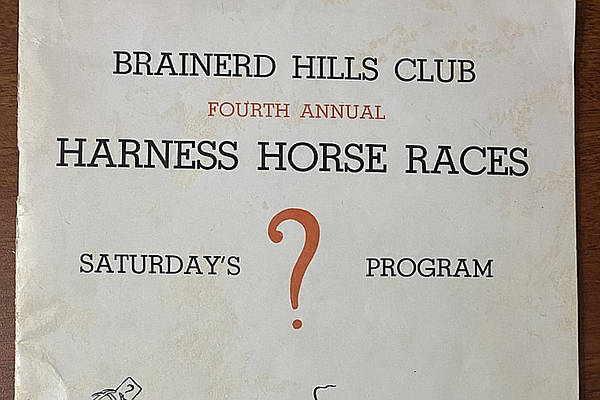As Chattanooga experienced unprecedented growth in the early 20th century and people moved out of downtown in search of new homes with more family-friendly amenities, it was only natural that suburbs would expand. One of Hamilton County’s older neighborhoods, just east of the Ridge, named for the historic 1817 mission to the Cherokee, emerged as an ideal community.
As the Brainerd community was initially an unincorporated area, the Brainerd Hills Club emerged as a “guiding and governing” force for the community. The 1950 yearbook describes the founding of the club and quotes President J. Raymond Johnson as saying, “The growth of this area as a community began in the late 1930’s and led to an almost inevitable development – the formation of a civic club.”
Johnson explained that the association was formed “to promote the general welfare of the community, encourage the intellectual and physical improvement of its residents, provide for social interaction, encourage athletic sports and give financial assistance to various charitable organizations and to disadvantaged families in the community.”
Johnson credited the Brainerd Hills Club’s first seven presidents – Will F. Chumley, W. A. Bentel, U. K. Whaley, Willard R. Smith, Borden Findlay, W. L. Williamson and William L. Ray – for “great progress toward this goal” and focused on the opportunities presented by the new charter granted by the state, which stipulated that club members could not “profit” from income derived from activities provided for the community and that all such funds would be dedicated to “charitable and social work.”
Dues from over 150 member families and various “promotional activities” raised funds to purchase a “well-appointed” clubhouse with beautiful grounds. With no debt, the 1950 leadership team focused on expansion plans to include a swimming pool, playground, and other recreational facilities. Johnson, with input from the Brainerd Hills Woman’s Club and its officers, including president Doris Hall, vice president Leone Field, secretary Martha Kinzing, treasurer Dee Dee Johnson, and communications secretary Lois Whaley, predicted that all goals would be achieved in the “not too distant future.”
The Women’s Club, working with other club leaders, coordinated many promotional efforts, “most prominently the annual harness races held at the Dave L. Brown Race Track,” as advertised in the program for the Fourth Annual Harness Horse Races in 1947. Past funds were used to establish the Bonny Oaks Educational Fund. Beneficiaries of this effort included educational scholarships for “less fortunate students” at Bonny Oaks Home, two athletic scholarships to the University of Chattanooga, and financial support for Chattanooga charities, including the American Red Cross, Hamilton County Memorial Hospital Fund, the Salvation Army, and outreach programs of churches in the Brainerd area.
(Few residents today know that Chattanooga was once the site of annual carriage races, or that those races were a staple in the Brainerd area.)
Brainerd Hills harness racing, with first place prizes running into the hundreds and sometimes thousands of dollars, attracted participants from across the U.S. and abroad in partnership with the Southern Trotting Association (STA). The governing body for harness racing in the southeast, the STA included representatives from 18 member cities, horse owners and breeders, licensed drivers, trainers and “enthusiasts of the sport.” Dave L. Brown of Chattanooga served as president of the association. U.K. Whaley promoted the organization’s races.
An extant program for the Brainerd Hills Club Harness Horse Races, scheduled for Aug. 30 and Sept. 1 and 3, 1947, notes racehorses with intriguing names, including Shawnee Hanover, Dixie Worthy, Scottish Georgia Boy and three of Dave L. Brown’s horses (each with the Brainerd name prominently displayed), Linda Brainerd, Katherine Brainerd and Cleo Brainerd. More than 100 local businesses purchased advertising in the program, potentially evoking memories for older residents today. Among the advertisers were the Casablanca Club on Cummings Highway, Mills and Lupton Supply Company, Tabby Haswell’s Sporting Shop in the Reed House, Robert Scholz Tannery, Chattanooga Sausage Company, Title Guaranty and Trust Company, and the B.F. Goodrich Company, which offered “pre-war tires” for sale.
Each Brainerd Hills Club publication features an excerpt from Robert Sparks Walker’s “The Brainerd Mission,” evidence that the Brainerd Hills Club understands that the past, present and future are intertwined.
Linda Moss Mines is the Chattanooga and Hamilton County Historian. For more information on local history, visit Chatahistoricalassoc.org.


